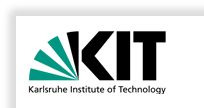Purpose
The Monte Carlo method is a numerical simulation technique that can be used to extend the scope of calibrations performed in in vivo monitoring laboratories. These methods allow calibrations to be made for a much wider range of body shapes and sizes (including children) than would be feasible using physical phantoms. Karlsruhe Institute of Technology (KIT) and the European Radiation Dosimetry Group – (Working Groups WG7 „Internal Dosimetry" and WG6 "Computational Doismetry") are organizing a training course focusing on the application of Monte Carlo methods for the calibration of whole and partial body counters
Topics
It will be hands-on-training, centered on an exercise in KIT‘s in vivo lab which will guide the participants through all steps of a Monte Carlo calibration of an in vivo counter using voxel phantoms. Lecturers and tutors will be known experts on Monte Carlo methods and in vivo monitoring from European Institutions collaborating in EURADOS working groups on computational (WG6) and internal dosimetry (WG7).The biggest part of the course will be hands-on-training, centered on an exercise in KIT‘s in-vivo lab.
Prerequisites
The Monte Carlo code used throughout the course will be MCNP(X). Thus all participants are required to have at least a basic knowledge of MCNP(X). The number of participants is limited to 20. Participants should bring their own laptops and if possible a licensed copy of MCNP(X). Participants are invited to bring a poster presenting their own laboratory and work.
Training Course Format
Short introdcutory lectures will summarize the basics of in-vivo counting, Monte Carlo Methods and Voxel models. The biggest part of the course will be hands-on-training, centered on an exercise in KIT‘s in-vivo lab. Based on a „case study“ the exercise will guide the participants step by step through a Monte Carlo calibration of an in-vivo counter using voxel phantoms. Lecturers and tutors will be known experts on Monte Carlo methods and in-vivo monitoring from European Institutions collaborating in EURADOS working groups on computational (WG6) and internal dosimetry (WG7). Course material will beprovided in printed and digital form at the course. The Monte Carlo code used throughout the course will be MCNPX. Thus all participants are required to have at least a basic knowledge of MCNP. For the exercise part of the course you should bring a laptop with a licensed copy of MCNP to work on this. Alternatively participants may work in groups.

